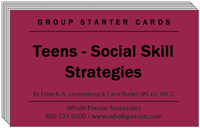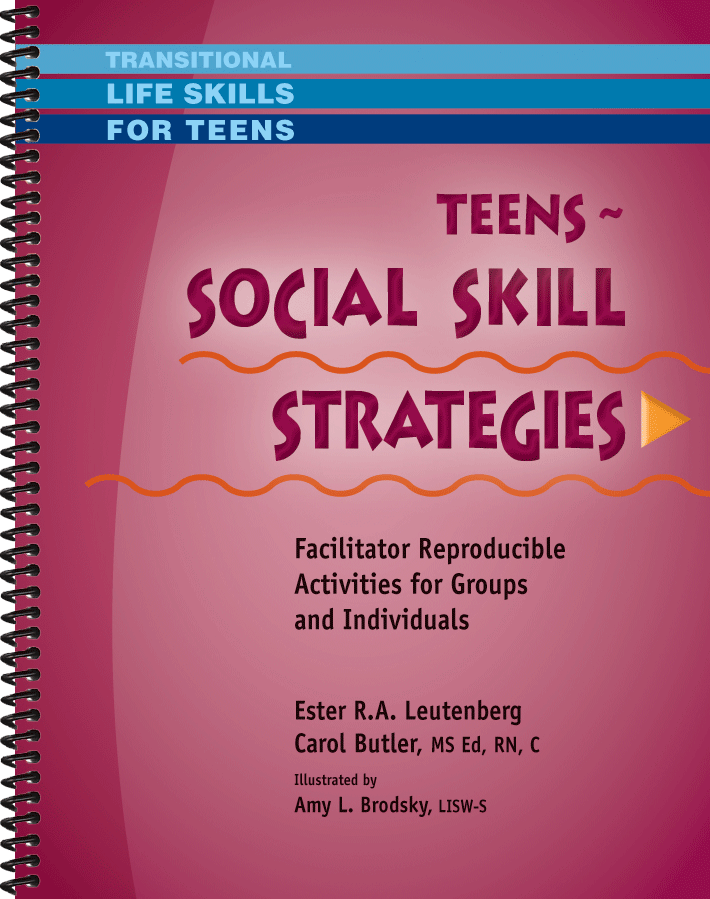Teens - Social Skill Strategies
Facilitator Reproducible Social Skills Activities for Groups and Individuals
Social skills constitute more than a time-honored list of modern manners; they are ways to thrive in today’s world.
In this workbook, Teens – Social Skill Strategies, teens learn by doing, from each other, and through thought and feedback. Using various social skills activities, real life comes to the classroom, group room, or personal space as teens practice new skills and begin to change negative behaviors. Awareness of societal expectations, empathy, ethics, and altruism are not taught but lived through simulated and actual situations. Verbal and non-verbal communication, social graces, the desire to fit in, diversity, inclusion, finding and being a friend, family relationships, forgiveness, first love, breakups, humanitarianism, and other topics are featured. Social issues, including abuse prevention and other topics, are addressed.
Active learning occurs as teens consider social life and social consciousness through social skills activities, including interactive games, reflective drawing and writing, mock videos, role plays, panel discussions, press conferences, drama, music, pantomimes, and other activities.
Each chapter contains a variety of social skills activities.
Seven Chapters, four to ten sessions per chapter (total of forty-seven), encompass the following:
- Communication
Body language, personal space, behavioral cues, active listening, conversations, first impressions, communication starters and stoppers, assertiveness, and negotiation skills.
- Expectations
Technology, social networking, mealtime, introductions, first dates, events, travel, condolences, diplomacy, job interviews, work relationships, and sportsmanship.
- Fitting In
Parent/caregiver issues, excessive people pleasing, acceptance of self and others, respectful disagreement, shyness, positive personality traits, newcomers, diversity, and multicultural contributions to society.
- Friendship
Positive peer support, non-aggression, frenemies, the influence of words and actions, friendship lyrics, envy and jealousy, and helping a person in crisis.
- Family
Traditional and non-traditional family styles, changes at home, sibling rivalry, respect for authority without fear or rebellion, and forgiveness.
- Teen Love
Healthy and unhealthy relationships, parent/caregiver concerns, first love, expression through art and poetry, dating dilemmas, breakups, and power principles.
- Caring
Empathy, social causes, creative fundraisers, ways to help at home, school, community, etc., advocacy in action, leadership as a passion for serving versus self-serving power.
This workbook is also available in PDF eBook format, making it simple to store on your computer or mobile device and to access with a PDF viewer. The PDF format allows you to easily print copies of the activities and worksheets during therapy and counseling sessions.
 Teens – Social Skill Strategies Card Deck
Teens – Social Skill Strategies Card Deck
This deck of open-ended questions will help teens get in touch with feelings and kick-start lively discussions. Each question corresponds to a specific page in the book, and a variety of social skills activities.
Sample Questions:
Share a time your first impression of someone turned out to be right or wrong. In one word describe the first impression you think people form about you.
Whom do you think has more influence on you: parent/caregivers, other adults, or peers? Explain.
Can a person be powerful and respectful at the same time? Explain.


